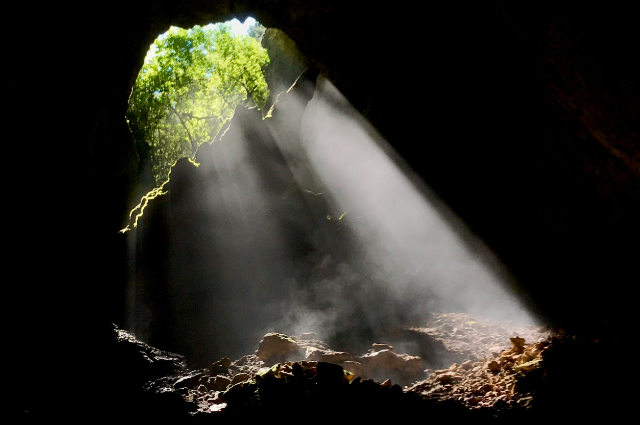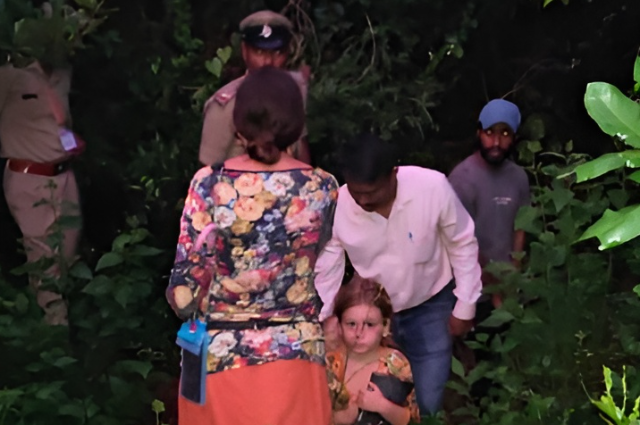
Photo by Valentin Jorel on Unsplash/ Representative Image
In an extraordinary turn of events that highlights both the appeal of spiritual India and the complexities of modern life, a 40-year-old Russian woman and her two young children were discovered living in complete isolation within a natural cave in Karnataka's Uttara Kannada district. This remarkable story which unfolded over nearly two weeks of wilderness survival that raises profound questions about spiritual pursuit, parental responsibility, and the administrative challenges of tracking foreign nationals in India.
A Routine Patrol Leads to an Extraordinary findings
The rescue operation began as a standard post-landslide patrol in the Ramatirtha hills of Kumta taluk, but quickly transformed into something far more unusual. Circle Inspector Sridhar and his team were conducting their routine security sweep when they noticed something distinctly out of place in the dense forest landscape - colourful sarees and children's clothing hanging outside what appeared to be a natural cave formation.
This seemingly innocent discovery led to one of the most unique rescue operations in recent Karnataka police history. The officers displaying both curiosity and caution, navigated through thick underbrush and challenging terrain to investigate what they initially thought might be evidence of illegal activity or displaced persons following recent landslides in the region.
The Spiritual Seeker and Nina Kutina's Journey to Gokarna
The woman at the centre of this extraordinary story, Nina Kutina, who goes by the alias Mohi, represents a fascinating intersection of global spiritual seeking and India's enduring reputation as a destination for those pursuing religious enlightenment. Having arrived in India several years ago on a business visa and her journey from Russia to the remote caves of Karnataka reflects a deeper transformation that many foreign visitors experience when encountering India's spiritual traditions.
Mohi's path led her from the coastal state of Goa - itself a popular destination for long-term foreign residents to the sacred town of Gokarna. This ancient pilgrimage site, renowned for its profound religious significance and meditative atmosphere, has long attracted both Indian pilgrims and international spiritual seekers. The town's reputation as a place where one can achieve a deep spiritual connection clearly resonated with Mohi, who had developed a strong affinity for Hinduism and Indian spiritual practices.
Life in the Wasteland: Creating a Sacred Space
The family's living situation in the cave reveals the extent of Mohi's commitment to her spiritual practice. Far from simply taking shelter, she had transformed the natural cave into what can only be described as a makeshift temple and meditation retreat. The installation of a Rudra idol and a representation of Lord Shiva in his fierce form demonstrates her deep engagement with Hindu religious practices and her attempt to create a sacred space for worship and contemplation.
The daily routine appeared to centre around traditional Hindu practices, with Mohi spending considerable time in puja (worship rituals) and meditation. This dedication to spiritual practice, while admirable in its sincerity, raises serious questions about the welfare of her two young children, Preya, aged 6, and Ama, aged 4, who were experiencing this extreme form of spiritual retreat alongside their mother.
Survival Challenges and Parental Concerns
Perhaps the most concerning aspect of this story involves the practical challenges of survival in such an isolated environment with two small children. The family had been sustaining itself for nearly two weeks in conditions that would challenge even experienced survivalists. While Mohi reportedly managed to live "off the land," the exact methods of obtaining food and water remain under investigation by local authorities.
The dense forest and steep terrain surrounding their cave shelter would have presented numerous dangers, from wildlife encounters to the risk of injury from falls or exposure to the elements. The fact that all three family members were found in "reasonably good health," as confirmed by Uttara Kannada Superintendent of Police M Narayana, speaks to either remarkable resilience or extraordinary luck - perhaps both.
Immigration and Legal Complexities
The discovery of this family has also revealed significant administrative concerns regarding foreign nationals in India. Authorities have determined that Mohi's visa expired in 2017, meaning she has been living in the country illegally for several years. This revelation adds another layer of complexity to an already unusual situation and raises questions about the systems in place to track and monitor foreign visitors who overstay their permitted duration.
The exact timeline of Mohi's stay in India remains unclear, though police suspect she made her way from Goa to Karnataka before ultimately settling in the forested region around Gokarna. This movement pattern suggests a gradual progression towards increasingly remote locations, possibly reflecting a desire to avoid detection or simply a spiritual journey towards greater isolation and simplicity.
Spiritual Tourism and Its Challenges
This incident highlights the complex relationship between India's reputation as a spiritual destination and the practical realities of hosting long-term foreign spiritual seekers. While India has always welcomed those genuinely interested in its religious and philosophical traditions, cases like this demonstrate how spiritual seeking can sometimes lead to situations that put both the seekers and their dependents at risk.
The story also raises important questions about the responsibilities of spiritual seekers, particularly those with young children, to balance their personal spiritual journeys with basic safety and legal requirements. The romantic notion of retreating from modern society to pursue spiritual enlightenment becomes considerably more complex when it involves vulnerable minors who cannot make such choices for themselves.
A Story of Many Dimensions
The rescue of Nina Kutina and her children from their cave dwelling represents more than just an unusual news story - it serves as a lens through which we can examine the intersection of spiritual seeking, parental responsibility, immigration law, and the enduring appeal of India's spiritual traditions. While the family's physical well-being appears to have been preserved, the long-term implications of this experience, particularly for the children involved, remain to be fully understood.
As authorities continue their investigation into the circumstances surrounding this case, it serves as a reminder of the complex challenges faced by both spiritual seekers and the communities that host them. The story ultimately reflects both the profound draw of India's spiritual landscape and the importance of ensuring that such pursuits are conducted within the bounds of safety, legality, and responsible parenting.
. . .
References:

